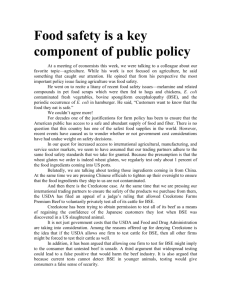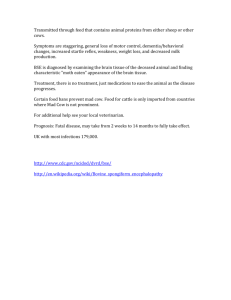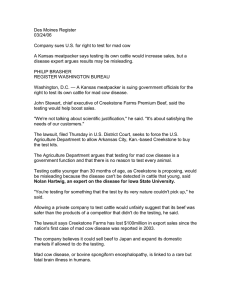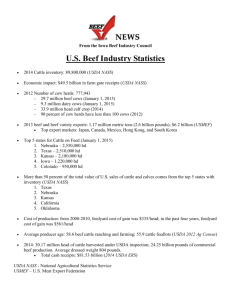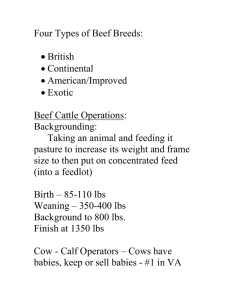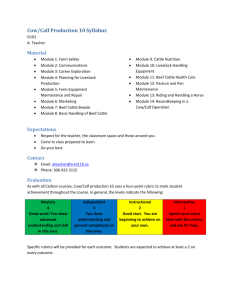Too Much of a Good Thing? USDA Blocks Private Efforts... Disease By Phyllis Griffin Epps, J.D.
advertisement
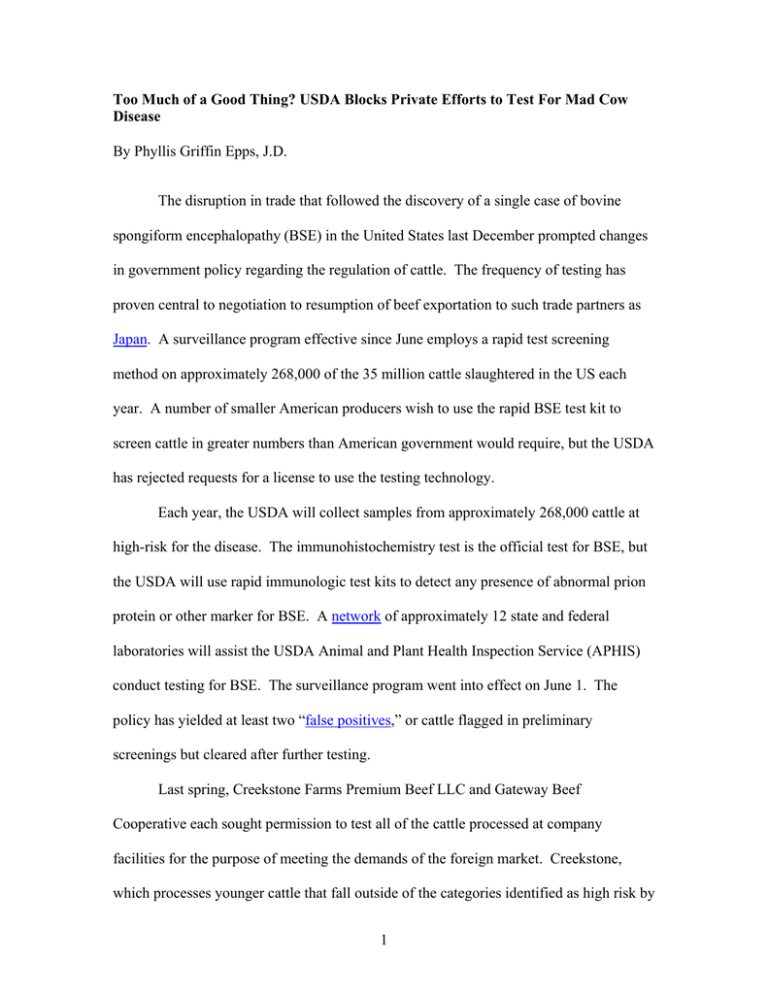
Too Much of a Good Thing? USDA Blocks Private Efforts to Test For Mad Cow Disease By Phyllis Griffin Epps, J.D. The disruption in trade that followed the discovery of a single case of bovine spongiform encephalopathy (BSE) in the United States last December prompted changes in government policy regarding the regulation of cattle. The frequency of testing has proven central to negotiation to resumption of beef exportation to such trade partners as Japan. A surveillance program effective since June employs a rapid test screening method on approximately 268,000 of the 35 million cattle slaughtered in the US each year. A number of smaller American producers wish to use the rapid BSE test kit to screen cattle in greater numbers than American government would require, but the USDA has rejected requests for a license to use the testing technology. Each year, the USDA will collect samples from approximately 268,000 cattle at high-risk for the disease. The immunohistochemistry test is the official test for BSE, but the USDA will use rapid immunologic test kits to detect any presence of abnormal prion protein or other marker for BSE. A network of approximately 12 state and federal laboratories will assist the USDA Animal and Plant Health Inspection Service (APHIS) conduct testing for BSE. The surveillance program went into effect on June 1. The policy has yielded at least two “false positives,” or cattle flagged in preliminary screenings but cleared after further testing. Last spring, Creekstone Farms Premium Beef LLC and Gateway Beef Cooperative each sought permission to test all of the cattle processed at company facilities for the purpose of meeting the demands of the foreign market. Creekstone, which processes younger cattle that fall outside of the categories identified as high risk by 1 the USDA, reported losses of $1 million revenue in foreign sales each week since December. Neither Creekstone nor Gateway asserts that the existing science regarding BSE dictates a need for universal testing. Each wishes to spend the money necessary to conduct additional, perhaps superfluous, testing because doing so would increase the value of their product on the foreign market without endangering public safety. The USDA nevertheless has restricted the sale of rapid BSE test kits to government laboratories and blocked efforts by companies in the private sector to conduct rapid BSE testing on cattle outside of the agency’s surveillance plan. Regarding Creekstone, the agency objected to the company’s plan to test all of its cattle as neither warranted nor justified by science. The agency further objected to the use of the rapid BSE test as a test for food safety rather than a tool for disease surveillance. According to agency spokespersons, the USDA must limit testing to avoid a public perception of problems with consumer safety.1 The USDA does not wish to lend credence to the perception that meat not tested for BSE is, by definition, less safe or poorer in quality. The damage caused by the announcement of the “false positive” test results, though difficult to measure, diminishes the argument for private testing. Critics of the agency’s position blame the undue influence of lobbyists for the beef industry for what is viewed as unfair government interference with market forces. The National Cattlemen’s Beef Association, for example, opposes universal testing. According to other news reports, industry representatives worry that Japan will have no incentive to import American beef if it can procure meat from smaller slaughterhouses that test every animal.2 2 Creekstone plans to challenge the legal authority of the USDA to prohibit companies in the private sector from voluntarily testing cattle for BSE.3 The company questions the constitutionality of the agency’s actions to prevent beef producers from the use of private testing to exceed minimal standards for quality or safety. Through the Virus, Serum, and Toxins Act (VSTA) of 1913, Congress authorized the USDA to regulate the sale of products “intended for use in the treatment of domestic animals.”4 Consistent with federal powers to regulate interstate and foreign commerce, the VSTA and rules promulgated under the statute by the USDA preempt most local and state laws on the subject.5 The authority to restrict the sale of the rapid BSE test kit is arguably comparable to that regarding the sale of animal vaccines and other drugs.6 The complaining party in this instance is not the manufacturer of the test kit, but instead a would-be purchaser. Absent any cases on point, the likelihood of a successful challenge is uncertain. Private producers like Creekstone may enjoy better odds of changing policy by continuing to promote their cause before Congress and in the court of public opinion. 1 Kaufman, Marc. Company’s Mad Cow Tests Blocked: USDA Fears Other Firms’ Meat Would Appear Unsafe. WASH. POST Apr. 16, 2004, at A1. 2 Simon, Stephanie. U.S., Some Ranchers Clash Over Mad Cow Tests; The USDA rejects the need to certify all cattle, a policy that blocks some beef exports, L. A. TIMES, May 24, 2004, at A1. 3 (Bloomberg) Creekstone may sue over beef-testing ban. THE WICHITA EAGLE, May 8, 2004, at 5. 4 21 U.S.C. § 151. 5 Cf. Symens v. SmithKline Beecham Corp., 152 F. 3d 1050 (8th Cir. 1998). 6 See generally Behrens v. United Vaccines, Inc., 189 F. Supp. 2d 945 (D. Minn. 2002). 3
